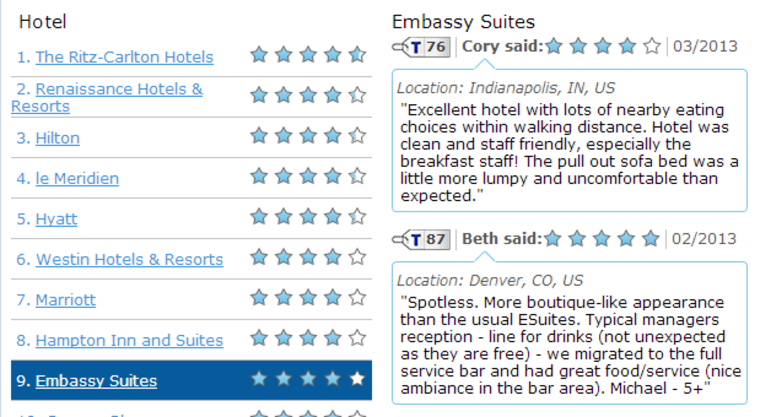The wisdom of the crowd has its merits, but do you trust it with your vacation plans? Betting customers are answering "maybe not," Traxo has launched a verified-review system to re-establish faith in online travel user reviews, which have fallen prey to sock puppets and gaming.
Approximately 6 percent of reviews on sites that don’t require verification are likely to be false or deceptive attempts by operators to make their business look better, according to research by Jeff Hancock, an associate professor at Cornell. By the end of 2014, 10 to 15 percent of reviews will be phony, forecasts Jenny Sussin, principal research analyst at Gartner, Inc.
Last week, TripAdvisor announced that it was the first travel site to reach 100 million reviews and opinions, a year-over-year increase of more than 50 percent. “Nothing helps travel planning more than real reviews from real people who have been there before,” said Steve Kaufer, co-founder and CEO, in a statement.
But bogus boosterism isn’t hard to find evidence of. Just look at the online classifieds by review-hungry businesses seeking ethically challenged writers. “I am looking for person who has a personal account in Trip Adviser [sic]. I will pay $5 for just one single review” reads a December post on Digital Point. “I will write 2 positive reviews for your business, website or product for $5” reads another on Fiverr.
“For every one-star increase in a hotel, it can lead to an 11-percent increase in occupancy,” said Hancock.
That’s one incentive for the rise of sites that only accept so-called "verified reviews," reviews from people who can prove they've used the travel provider they’re writing about.
Earlier this month, itinerary management/loyalty tracker Traxo.com launched a verified-review system, joining the likes of Expedia and Hotels.com.
Although still a work in progress — reviews are currently limited to short Twitter-like blurbs — the Traxo system takes the concept further. Whereas Expedia’s verified reviews are limited to people who book through the site itself or its sister sites, Traxo accesses members’ bookings across more than 1,300 provider sites.
By aggregating that information, the site compiles a Travel Score for each member based on the number of destinations they visit, the number of days they travel and other variables. According to the site's formula, the higher the score, the more credible the reviewer.
“Not only is the review verified,” said CEO Andres Fabris, “but you can know that it was written by someone who is objectively a travel expert vs. someone who may be a travel novice.”
Then again, what constitutes expertise is open to interpretation and restricting reviews to those who have “paid and stayed” comes with its own caveats, a point that’s not lost on the management at TripAdvisor.
“We believe all travelers, not just the one individual who made the reservation or has the receipt, is entitled to share their honest feedback about where they have stayed,” said Adam Medros, vice president of global product. “We know from user feedback that our visitors value both the quantity and quality of the reviews that they can only find on TripAdvisor.”
Medros also defends the legitimacy of the site’s reviews, citing sophisticated automated tools, and policing by the TripAdvisor community as well as an internal quality assurance specialist team.
Ultimately, says Hancock, the anonymous vs. verified issue comes down to a trade-off. Sites that rely on verified reviews may have fewer fake ones but they’ll also have fewer reviews overall. Sites that allow anyone to post may have more fake reviews, but they’re part of such a huge pool they’re likely to have less impact.
For her part, Sussin suggests looking at multiple sites to come up with an average rating, being wary about overly positive or negative reviews and checking out reviewers’ profiles. “If they’ve only reviewed one or two things or they don’t have a profile picture, it could be suspicious,” she said.
Or, to borrow a phrase made popular by former President Ronald Reagan, trust, but verify. Then decide for yourself who you believe.
Rob Lovitt is a longtime travel writer who still believes the journey is as important as the destination. Follow him on Twitter.
